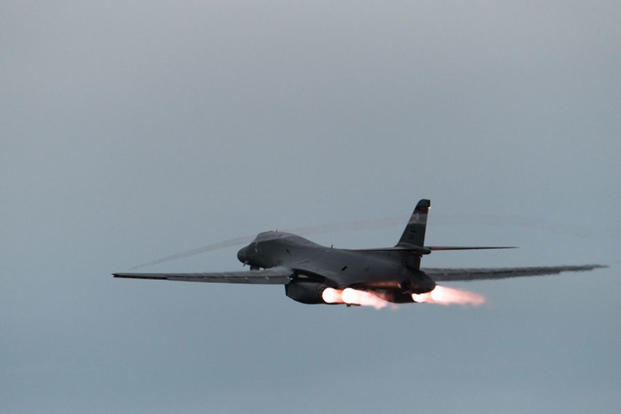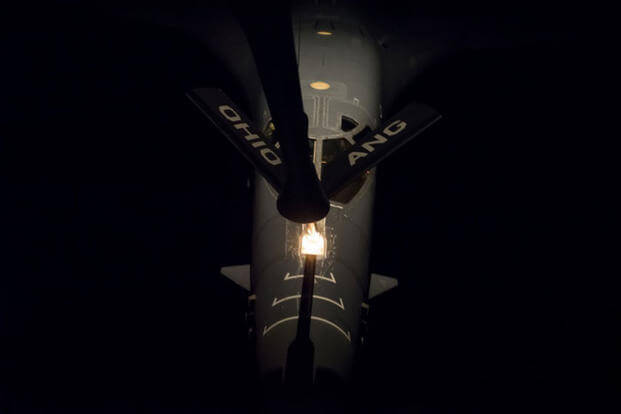Mark another milestone for the U.S.' deterrence campaign against North Korea.
Two B-1B Lancer supersonic bombers flew alongside South Korean F-15 fighter jets over the Korean peninsula Tuesday evening, South Korea's military said in a release.
Japanese fighter aircraft then joined the Lancers to conduct joint drills over the Sea of Japan.
The exercise marks the first time the U.S. Pacific Command-assigned bombers have conducted combined drills with the Japan Air Self-Defense Force and Republic of Korea at night, U.S. Pacific Air Forces said in a separate release.
Related content:
- START Lanced the B-1's Nukes, But the Bomber Will Still Get New Bombs
- US Can Block North Korean Missiles -- For Now, Leaders Say
- NORTHCOM General 'Amazed' at North Korea's Rapid Missile Advances
Upon entering South Korean airspace, the bombers -- assigned to the 37th Expeditionary Bomb Squadron at Ellsworth Air Force Base, South Dakota -- carried out a few simulated air-to-ground bomb drops over the water near South Korea's east coast.
"Flying and training at night with our allies in a safe, effective manner is an important capability shared between the U.S., Japan and the Republic of Korea and hones the tactical prowess of each nation's aviators," said Air Force Maj. Patrick Applegate of the 613th Air Operation Center at Hickam Air Force Base, Hawaii.
"This is a clear demonstration of our ability to conduct seamless operations with all of our allies anytime anywhere," Applegate said.
The latest flight marks the second nighttime operation for the bombers, nicknamed the Bone.
Lancers -- no longer nuclear-capable aircraft -- flew a night operation Sept. 23 with U.S. F-15C Eagle escorts.
The aircraft flew north of the Demilitarized Zone, to the farthest point of the border between North and South Korea by any such American aircraft in the 21st century.
While the Air Force said Tuesday's flight was part of routine training, the recent flyover marks another in a series of actions the U.S. has taken to deter North Korea's Kim Jong-un from additional ballistic missile or nuclear bomb tests.
The B-1B replaced the B-52 Stratofortress in theater for the U.S.' continuous bomber presence mission last August.
The shift marked the first time the B-1B has been housed at Andersen Air Force Base, Guam, since 2006.
-- Oriana Pawlyk can be reached at oriana.pawlyk@military.com. Follow her on Twitter at @Oriana0214.






























